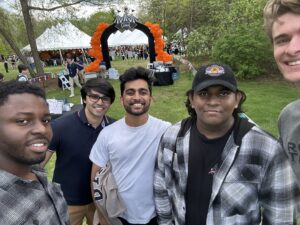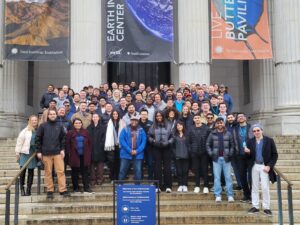Changing Careers via the Information Systems-Bridge Program

Rupesh Rokade, MS’25, information systems-bridge, changed his master’s degree program to open a new world of possibilities in the technology and software industries. Now Rupesh is completing a co-op at Amazon Robotics and continuing to achieve his career ambitions.
Rupesh Rokade took many steps in his academic journey to Northeastern University. Rupesh completed his undergraduate degree in civil engineering back home in India. During undergraduate studies, he wanted to switch his major to computer science. However, due to the rigidness of the university system in India, he was unable to do so. He felt as though his passion for computers and technology would never be actualized in his future career endeavors.
Rupesh decided to come to the United States to pursue a master’s degree in civil engineering at the University of Illinois. After getting acclimated to living in the U.S, Rupesh realized all the opportunities he had and started looking for master’s programs that were more tailored to his passions. When he heard about Northeastern’s Information Systems-Bridge master’s program – tailored for those changing direction after their undergraduate degree – he knew it was the right choice for his journey.
Rupesh chose the information systems program due to its high technicality; he believed it would be good for him, especially coming from a different background outside of computers and technology. He was also excited to take part in all the experiential learning opportunities Northeastern has to offer.
Rupesh said the program “gave me a solid foundation” and “good exposure to what different things are, what different kind of work goes on in those fields, and then helped me make decisions as to where I want to study and focus my efforts on”. He explained: “Information systems-bridge does not necessarily confine you to one route, whereas it can help you go down three different routes. It could be if you’re interested in data architecture, you can go take a lot of courses in that, you can take a lot of courses in software engineering systems, as well as information systems.”
Co-op at Amazon Robotics
A huge part of Rupesh’s experience at Northeastern has been his co-op. Rupesh is currently working at Amazon Robotics as a systems engineer on the product analytics and customer excellence team. Rupesh’s team helps support the technologies that are being deployed live on fields. Rupesh, additionally with his team helps maintain a CRM tool called ServiceNow. ServiceNow is used by project managers, program managers, and portfolio managers to update the work they have been doing, the progress status of projects and other various tasks.

Rupesh and his co-workers at Amazon Robotics at a company outing.
Part of Rupesh’s co-op project was to build a workspace on ServiceNow for program managers. Project managers can access and manage their workspace on ServiceNow, but not program managers. Since program managers need to manage various sites at once, they need certain requirements for a workspace, which is what Rupesh helped build.
During his co-op, he was tasked with upgrading the internal documentation pages across the entire organization and standardizing them as well. His responsibilities include developing a software solution to migrate teams—spanning approximately 4,000 employees—and their internal documentation websites to a new template he designed.
At co-op, Rupesh has started working on a new project which entails developing a Retrieval-Augmented Generation (RAG) pipeline to enhance internal AI systems. As well as improving answer accuracy by combining large language models (LLMs) with internal data sources.
During his co-op, he has learned one main thing. To not be shy or afraid to speak up during meetings or presentations. He said teams appreciate when you have “confidence to navigate across different situations.” Rupesh recounts that during his second week of co-op, he went to an off-site meeting that comprised 250 people. He said it was an incredible chance to get familiar with many people in the company and help develop bonds. Additionally, he had a mid-co-op presentation he had to give in front of six managers. Both of these experiences required him to use his voice to advance his career.

Rupesh and his co-workers at Amazon Robotics at an off-site company meeting.
In the Classroom
Rupesh said there were two classes he has taken in his degree program that have most helped him succeed at his co-op. The first class was “Network Structures and Cloud Computing” with Adjunct Professor Tejas Parikh. The course had a vigorous curriculum that required lots of hard work, which Rupesh believes has helped him tremendously in his career. Rupesh said the course has helped him “understand the entire software development lifecycle as well as what happens after you develop software.” After completing the course, Rupesh emerged with “the entire picture of how business work, how businesses make money, and how software engineers or system engineers come into play.”
The second class was “Program Structure and Algorithms” taught by Teaching Professor Dino Konstantopoulos. Rupesh said that Professor Konstantopoulos always took extra time out of his life and scheduled class hours to help students understand the material. Rupesh thought this course was extremely helpful in preparing for interviews with software companies. He came out of the course feeling confident with interview questions related to data structures and algorithms.
Looking Ahead
Rupesh expects to graduate in the Fall of 2025. Through his coursework and the projects he has completed on co-op, Rupesh has learned he would like to work as a software developer. Reflecting on his experience in the program as a whole now that he is about to graduate, he has learned the importance of taking difficult courses. He believes taking difficult courses, going through them with diligence and mastering those skills creates a competitive edge in the job market and opens more opportunities. He implores students to take more difficult classes due to their ability to lead to success.